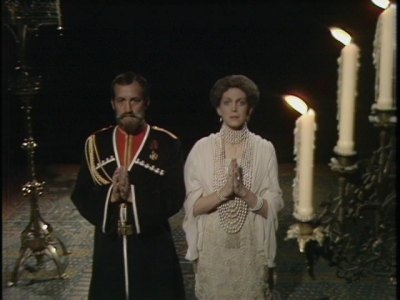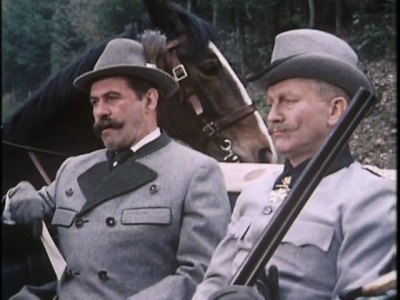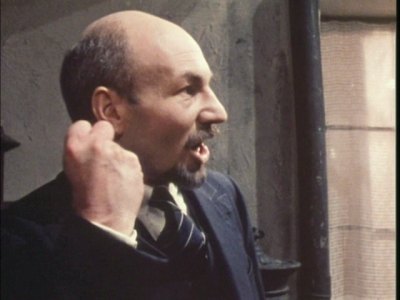| Reviews & Columns |
|
Reviews DVD TV on DVD Blu-ray 4K UHD International DVDs In Theaters Reviews by Studio Video Games Features Collector Series DVDs Easter Egg Database Interviews DVD Talk Radio Feature Articles Columns Anime Talk DVD Savant Horror DVDs The M.O.D. Squad Art House HD Talk Silent DVD
|
DVD Talk Forum |
|
|
| Resources |
|
DVD Price Search Customer Service #'s RCE Info Links |
|
Columns
|
|
|
Fall of Eagles
At the end of the 19th century, most of Europe was ruled by three dynasties: the Hapsburgs controlled the Austria-Hungarian Empire, the Romanovs were in power in Russia and Hohenzollerns of Germany. By the end of World War One however, all three of these houses had fallen. The story of the decline of these monarchies, as told through the people who were in power, has been adeptly portrayed in the 1974 BBC mini-series The Fall of Eagles. Koch Vision has now released this thirteen part series in the US, and though the audio and video quality leaves something to be desired, this is an informative and interesting series that will be sure to appeal to history buffs and fans of British drama alike.
This period costume drama starts in Vienna in 1848 where demonstrations for social justice were forcibly put down by the army. The episodes proceed chronologically from there, rotating chapters between events in the three largest contiguous empires in Europe: the Hapsburgs of Austria-Hungary, the Romanovs of Russia and Hohenzollerns of Germany. Focusing on the rulers and their heirs, the series illustrates how the face of Europe changed over the last half of the 19th century as liberal ideas infected the populace and with the help of World War I, eventually brought down these three great monarchies.
 Though this series might be a little dry for some tastes, there's very little action and most of the episodes involve people in period dress discussing politics, it is very watchable and incredibly informative. There was a lot that I learned about not only the origins of WWI, but also the philosophical thought of the ruling class at the time.
Though this series might be a little dry for some tastes, there's very little action and most of the episodes involve people in period dress discussing politics, it is very watchable and incredibly informative. There was a lot that I learned about not only the origins of WWI, but also the philosophical thought of the ruling class at the time.
One of the things that was fairly astonishing is how inept most of these rulers were. They had all been trained since birth to lead their empires, yet none of them were adept at ruling. Tzar Nicholas II didn't want to be in charge in the first place, crying when his father died since he knew the weight of leadership was now on his shoulders. Kaiser Wilhelm was likewise a poor leader and portrayed as a bit of a buffoon, looking at everything in the most simplistic and optimistic terms. The only person who came across as remotely competent was Emperor Franz Josef of Austria, but he's also gets the least amount of screen time.
It's been reported that the writers for each episode relied on original correspondences, diaries and speeches of the rulers and their families to come up with the scripts. This is easy to believe as the dialog tends to be a bit flowery and sounds more like the written word than conversations. This isn't bad, and doesn't mar the series. Instead it makes it feel authentic. Even if the dialog may have never been uttered, it accurately represents how the monarchs feel.
 The strength of this series is the way it puts a human face on these rulers "selected by God" and explains the confusing and convoluted events of early 20th century Europe. Viewers can feel Tzar Nicholas' pain as he asks his minister if every decision he's made in the past 22 years has been wrong, and sympathize with Kaiser Wilhelm's mother, Victoria, when her attempts to liberalize Germany cause her and her husband, not yet emperor, to be banned from all things political. The series also shows how Chancellor Bismarck was able to greatly expand Germany's power and unify the country in a very short amount of time.
The strength of this series is the way it puts a human face on these rulers "selected by God" and explains the confusing and convoluted events of early 20th century Europe. Viewers can feel Tzar Nicholas' pain as he asks his minister if every decision he's made in the past 22 years has been wrong, and sympathize with Kaiser Wilhelm's mother, Victoria, when her attempts to liberalize Germany cause her and her husband, not yet emperor, to be banned from all things political. The series also shows how Chancellor Bismarck was able to greatly expand Germany's power and unify the country in a very short amount of time.
Each and every episode is good, and the series main failings are only brought to light when it is taken as a whole. The show strongly presents the opinion that revolution was something that was destined to happen; that the people were ready for more power, and if they didn't obtain it when they did, they surely would have in another decade or so. Several people pontificate about history taking its course, and Bismarck, a person who almost single handedly changed the map of Europe, says that in the river of history he is just dipping his hand. I'm not sure I buy into that theory as whole-heartedly as the writers, and that point of view weakened the show just a bit.
 The main point of contention that I have with the series is that some of the episodes don't really have anything to do with the main thrust of the program, tracing the fall of three empires. The second episode about Queen Victoria's oldest daughter in Germany was a very good instalment, but was basically padding. Her husband, Frederick, had almost no influence in Germany before his father died, and when he finally does become Kaiser, he is bed ridden and too ill to do anything but sign whatever papers are put before him. The two of them had hardly any effect of the fall of the Hohenzollerns rule. The same goes for the Mayerling Incident, when Austrian Crown Prince Rudolf and his mistress are found dead, the result of a suicide pact. While the episode itself was interesting, it had nothing to do with the rest of the series.
The main point of contention that I have with the series is that some of the episodes don't really have anything to do with the main thrust of the program, tracing the fall of three empires. The second episode about Queen Victoria's oldest daughter in Germany was a very good instalment, but was basically padding. Her husband, Frederick, had almost no influence in Germany before his father died, and when he finally does become Kaiser, he is bed ridden and too ill to do anything but sign whatever papers are put before him. The two of them had hardly any effect of the fall of the Hohenzollerns rule. The same goes for the Mayerling Incident, when Austrian Crown Prince Rudolf and his mistress are found dead, the result of a suicide pact. While the episode itself was interesting, it had nothing to do with the rest of the series.
I was also disappointed to see that many important historical events glossed over. The assassination of Archduke Franz Ferdinand and the murder of Rasputin both happened off camera, and though the importance of both characters was discussed before their demise, the aftermath and effects of these deaths didn't get the screen time that they deserved. The last episode just mentions in passing the killing of Tsar Nicholas and his family and the death of Emperor Franz Josef, and the fall of the Austria-Hungarian Empire. This last part was the most distressing since the Hapsburgs were one of the 'eagles' in the title.
The acting in this series was excellent all around though. One of the favorite performances was by Patrick Stewart (ST:TNG) who plays Vladimir Ilyich Ulyanov (better known to the world as Lenin) and brings the communist leader to life, showing how strong and driven the man was. Charles Kay likewise does a wonderful job as Tzar Nicholas II, making him regal yet small. The stand out actor however was Barry Foster as Kaiser Wilhelm II. He made the German ruler pompous yet eminently likeable and it was always interesting when he was on the screen.
The DVD:
This thirteen episode series is presented on four discs. These come in a fold out book that is housed in a slipcase. For some odd reason they placed four episodes on each of the first three discs, and only a single show on the fourth DVD. There are no inserts.
Audio:
The two channel mono soundtrack is mediocre at best. The range is very limited and it distorts in some parts. There is a low amount of background noise but it isn't distracting. The dialog is easy to discern in most places however and this lack of fidelity doesn't mar the presentation significantly. There are no subtitles.
Video:
The full frame color picture leaves a bit to be desired even when taking the age of the show into account. The image is faded, very soft, and there are frequent spots and dirt. Details tend to disappear in dark areas, and black suits appear two dimensional. There are video dropouts also appear in almost every episode. Not only that, but there are many digital defects also. Cross colorization, aliasing, and digital noise are all common. While that series is watchable, it's only barely so.
Extras:
The bonus material included with this set is very disappointing. Given that there is only a single episode on the final disc, I was expecting more background information presented on the final disc. As it is, there are no extras on the first three discs. On the fourth disc there are recent interviews with actors Charles Kay (Tzar Nicholas II) and Gayle Hannicutt (Tsarina Alexandra) along with David Cunnliffe who directed three episodes. These are fairly pedestrian interviews, with common questions being asked. (How did you get started in acting? How did you approach your character?) There is also a photo gallery of production stills.
There's a lot that could have been included that wasn't. Commentary tracks by historians would have been easy to do and added a lot to the set. Baring that, some of the original correspondence or that the rulers gave would have been interesting to read. I would also have enjoyed seeing photos of the historical characters next to the actors in costume, but there were no vintage photos included. A family tree of the royal families in Europe would have been very helpful too, either on the last disc or preferably as an insert.
Final Thoughts:
Like many of the BBC's dramas, this one was very good. There were a few minor flaws that kept it from being outstanding, but it is still a series that is enjoyable and informative. History buffs will appreciate The Fall of Eagles, but anyone who enjoys good acting with some solid drama should make a point of seeing this. While the video quality on these discs is less than ideal and bonus material is unfortunately lacking, this set is still recommended.
|
| Popular Reviews |
| Sponsored Links |
|
|
| Sponsored Links |
|
|
| Release List | Reviews | Shop | Newsletter | Forum | DVD Giveaways | Blu-Ray | Advertise |
|
Copyright 2024 DVDTalk.com All Rights Reserved. Legal Info, Privacy Policy, Terms of Use,
Manage Preferences,
Your Privacy Choices | |||||||















